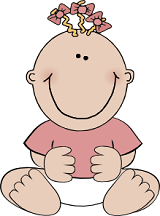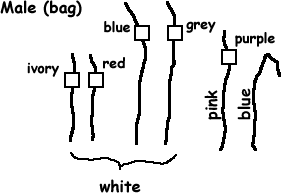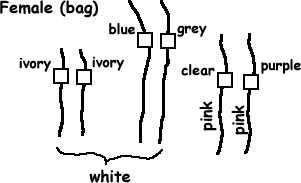Pipe Cleaner Babies
 In this activity you will play the role of a parent, your lab partner will play the role of the other parent. Yo will use chromosome and gene models to create four offspring and determine their genotypes and phenotypes. Then mathematically, you will determine the probability of having offspring with different traits.
In this activity you will play the role of a parent, your lab partner will play the role of the other parent. Yo will use chromosome and gene models to create four offspring and determine their genotypes and phenotypes. Then mathematically, you will determine the probability of having offspring with different traits.
How to Use the Model
You will receive a baggie with pipe cleaners and beads. The pipe cleaners represent chromosomes and the beads represent genes located on the chromosomes. In humans, there are 23 pairs of chromosomes and thousands of genes, but for this exercise, we will only focus on a few.
Without opening the bag, notice that you have four white and two colored pipe cleaners. If you have two pink chromosomes, you are to play the role of female (XX). If you have one pink and one blue, you are to play the role of the male (XY).
1. What do the pipe cleaners represent? ___________________________________
2. What do the beads represent? ______________________
3. Humans have ___________ pairs of chromosomes.
4. If you have two pink pipecleaners, you are playing the role of _________________
5. The blue pipecleaner represents the _________ chromosome.
Determine the parents' traits
Remove the chromosomes from the bag, but make sure you do NOT mix up you and your partner's chromosomes. Arrange the chromosomes in order of size, you should have two long white pipecleaners, two shorter pipecleaners, and the two colored pipecleaners.
The white pairs represent HOMOLOGOUS CHROMOSOMES.
The colored pairs represent SEX CHROMOSOMES
The red bead represents the dominant gene- dark hair
The ivory bead represents the recessive gene - blonde hair
DD= dark hair | Dd = dark hair | dd = blonde hair
What color hair does mom have ? _____ What is her genotype? _____
What color hair does dad have? ____ What is his genotype? _____
Eye Color (longer white pipe cleaners)
Grey bead represents the dominant gene - brown eyes
Blue bead represents the recessive gene - blue eyes
BB = brown eyes | Bb = brown eyes | bb = blue eyes
What color eyes does the mom have ______ What is her genotype? ____
What color eyes does the dad have? _____ What is his genotype? ____

Hemophilia (sex chromosomes, colored pipe cleaners)
The purple bead represents the dominant gene -- normal
The clear bead represents the recessive gene -- hemophiliacIn girls: HH = normal | Hh = normal (carrier) | hh = hemophiliac
In boys: H = normal | h = hemophiliac
What is mom's genotype? _________Is she a carrier? _________
What is dad's genotype? ___________
Why doesn't dad get two alleles for this trait?_____________________
Time to Start Your Family
--The dad places one set of the homologous pairs (ex: that longer set) behind his back, with a chromosome in each hand. The mom picks the hand she wants for the child. Lay this chromosome on the table in front of you and set the other aside.
-- Repeat this procedure for the other homologous pair (ex: shorter set) and for the sex chromosomes. Its should be noted that if the blue chromosome gets chosen from the sex chromosomes, the child in this cross is going to be a boy.
--Now the "mom" places one set of the homologous pairs behind her back and the male chooses.
-- The chromosomes chosen and set on the table in front of you are the genes your first child received.
Determine the Traits of Your First Child
Arrange the chromosomes into homologous pairs and figure out what phenotypes (appearance or trait) the offspring has.
What is the sex of the child? _________
What color eyes does the child have? _______ Genotype?______
What color hair does the child have? _______ Genotype?______
Is the child a hemophiliac? ______ Is the child a carrier for hemophilia? _____
Data Table
Go to the last page and see the data table, the first group is you and your partner. You are going to have 4 children. Repeat the procedure you used to make you first child to make 3 others. Fill out their traits on the table. When you are finished, compile the data from three other groups near you.
Replace all Chromosome into the correct baggie, make sure you have the right chromosomes in the bag and return.

 \
\
Analysis - answer on a separate page
1. Create a punnet square for each of the crosses, using your parents. (You'll have a square for hair color, eye color, and hemophilia)
2. Explain why women are carrier's for the disease hemophilia. Why do their sons, but not their daughters get the disease?
3. Describe the difference between how normal traits are inherited and how sex linked traits are inherited.
4. The data table where all the data is combined, shows how many ACTUAL offspring would have each of the traits. The punnet squares (from #1) show the PREDICTED ratios. Compare the actual to predicted ratios for all three traits.
5. Notice on the data table that no female has the disease hemophilia. Explain why.
6. If you knew you were a carrier for hemophilia (or your wife was), would you choose to have children. Explain your reasons.
Other Resources on Genetics
Practice Punnett Squares with Skinny Pigs – hairless guinea pigs are the result of a recessive gene (Key, TpT)
Peas, Please – practice setting up squares for basic Mendelian traits in pea plants (Key, TpT)
Horse Genetics – basic practice worksheet on monohybrid and dihybrid crosses, using a gait trait found in horses
Fruit Fly Genetics (Vg) – practice worksheet on vestigial wing flies (recessive trait)
